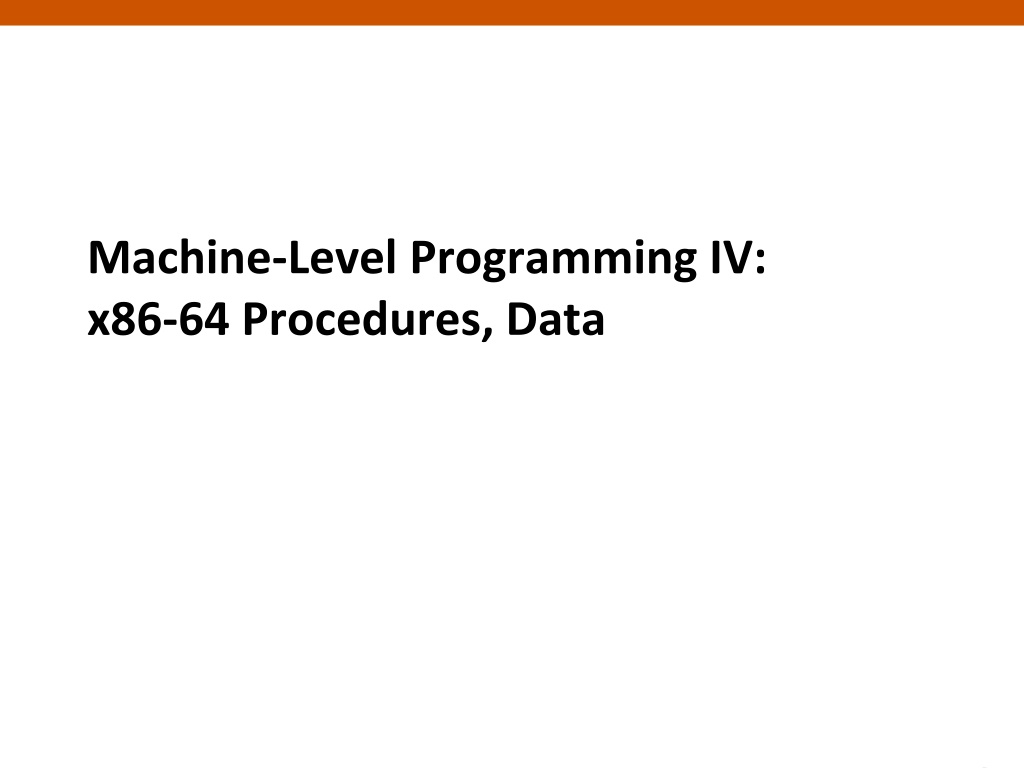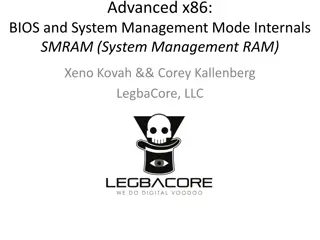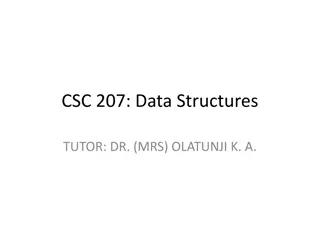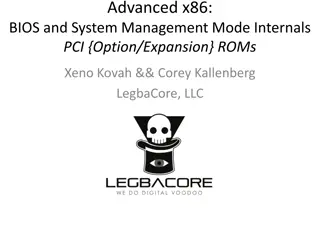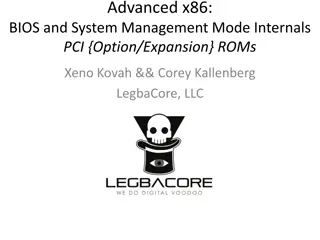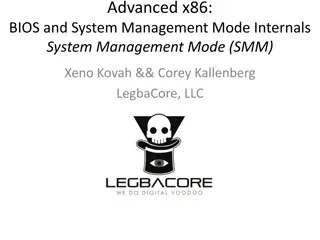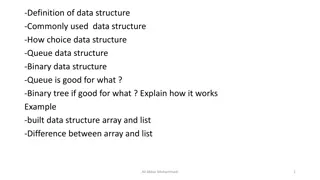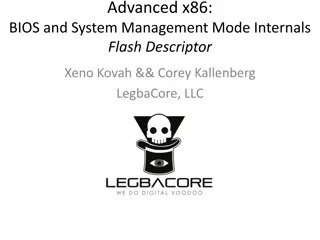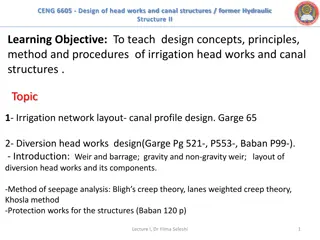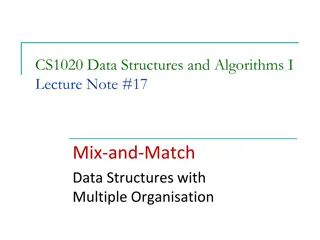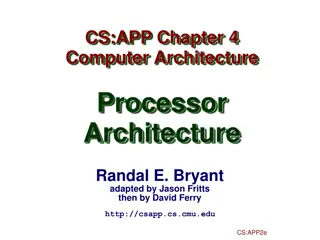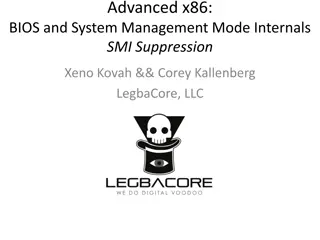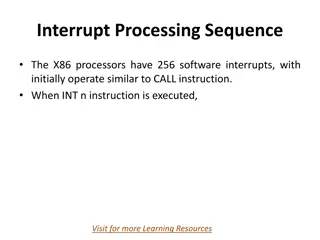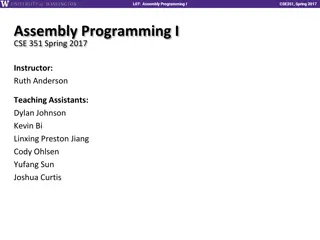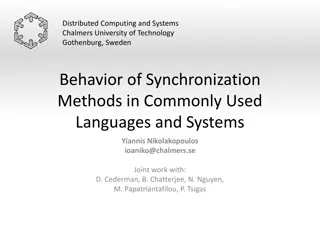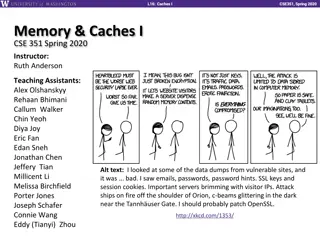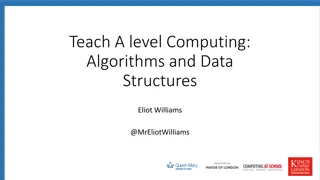Understanding x86-64 Procedures and Data Structures
This content provides insights into x86-64 programming, covering topics such as procedures, integer registers, stack frames, locals in the red zone, interesting features of stack frames, arrays, multi-dimensional structures, and more. It dives into the usage conventions of integer registers, the allocation of stack frames, passing arguments via registers, and accessing data in memory. The details include information on callee-saved and caller-saved registers, dealing with integral parameters in functions, and optimizing stack access. Additionally, it explores the manipulation of data structures like arrays and multi-level structures in the x86-64 architecture.
Download Presentation

Please find below an Image/Link to download the presentation.
The content on the website is provided AS IS for your information and personal use only. It may not be sold, licensed, or shared on other websites without obtaining consent from the author. Download presentation by click this link. If you encounter any issues during the download, it is possible that the publisher has removed the file from their server.
E N D
Presentation Transcript
Machine-Level Programming IV: x86-64 Procedures, Data 1 1
Today Procedures (x86-64) Arrays One-dimensional Multi-dimensional (nested) Multi-level Structures Allocation Access 2
x86-64 Integer Registers: Usage Conventions %rax %r8 Return value Argument #5 %rbx %r9 Callee saved Argument #6 %rcx %r10 Caller saved Argument #4 %rdx %r11 Caller Saved Argument #3 %rsi %r12 Callee saved Argument #2 %rdi %r13 Argument #1 Callee saved %rsp %r14 Stack pointer Callee saved %rbp %r15 Callee saved Callee saved 4
x86-64 Registers Arguments passed to functions via registers If more than 6 integral parameters, then pass rest on stack These registers can be used as caller-saved as well All references to stack frame via stack pointer Eliminates need to update %ebp/%rbp Other Registers 6 callee saved 2 caller saved 1 return value (also usable as caller saved) 1 special (stack pointer) 5
x86-64 Locals in the Red Zone swap_a: movq (%rdi), %rax movq %rax, -24(%rsp) movq (%rsi), %rax movq %rax, -16(%rsp) movq -16(%rsp), %rax movq %rax, (%rdi) movq -24(%rsp), %rax movq %rax, (%rsi) ret /* Swap, using local array */ void swap_a(long *xp, long *yp) { volatile long loc[2]; loc[0] = *xp; loc[1] = *yp; *xp = loc[1]; *yp = loc[0]; } Avoiding Stack Pointer Change Can hold all information within small window beyond stack pointer %rsp rtn Ptr unused 8 loc[1] 16 loc[0] 24 7
Interesting Features of Stack Frame Allocate entire frame at once All stack accesses can be relative to %rsp Do by decrementing stack pointer Can delay allocation, since safe to temporarily use red zone Simple deallocation Increment stack pointer No base/frame pointer needed 12
Today Procedures (x86-64) Arrays One-dimensional Multi-dimensional (nested) Multi-level Structures Allocation Access 14
Structure Allocation struct rec { int a[3]; int i; struct rec *n; }; Memory Layout a i n 12 16 20 0 Concept Contiguously-allocated region of memory Refer to members within structure by names Members may be of different types 15
Structure Access r r+12 struct rec { int a[3]; int i; struct rec *n; }; a i n 12 16 20 0 Accessing Structure Member Pointer indicates first byte of structure Access elements with offsets void set_i(struct rec *r, int val) { r->i = val; } IA32 Assembly # %edx = val # %eax = r movl %edx, 12(%eax) # Mem[r+12] = val 16
Generating Pointer to Structure Member r r+idx*4 struct rec { int a[3]; int i; struct rec *n; }; a i n 12 16 20 0 int *get_ap (struct rec *r, int idx) { return &r->a[idx]; } Generating Pointer to Array Element Offset of each structure member determined at compile time Arguments Mem[%ebp+8]: r Mem[%ebp+12]: idx movl sall addl 12(%ebp), %eax # Get idx $2, %eax 8(%ebp), %eax # idx*4 # r+idx*4 17
struct rec { int a[3]; int i; struct rec *n; }; Following Linked List C Code void set_val (struct rec *r, int val) { while (r) { int i = r->i; r->a[i] = val; r = r->n; } } a i n 12 16 20 0 Element i Register %edx %ecx Value r val .L17: movl 12(%edx), %eax movl %ecx, (%edx,%eax,4) # r->a[i] = val movl 16(%edx), %edx testl %edx, %edx jne .L17 # loop: # r->i # r = r->n # Test r # If != 0 goto loop 18
Today Procedures (x86-64) Arrays One-dimensional Multi-dimensional (nested) Multi-level Structures 19
Basic Data Types Integral Stored & operated on in general (integer) registers Signed vs. unsigned depends on instructions used Intel ASM byte b word w double word l quad word q Bytes 1 2 4 8 C [unsigned] char [unsigned] short [unsigned] int [unsigned] long int (x86-64) Floating Point Stored & operated on in floating point registers Intel ASM Single s Double l Extended t Bytes 4 8 10/12/16 long double C float double 20
Array Allocation Basic Principle TA[L]; Array of data type T and length L Contiguously allocated region of L * sizeof(T) bytes char string[12]; x x + 12 int val[5]; x x + 4 x + 8 x + 12 x + 16 x + 20 double a[3]; x x + 8 x + 16 x + 24 char *p[3]; IA32 x x + 4 x + 8 x + 12 x86-64 x x + 8 x + 16 x + 24 21
Array Access Basic Principle TA[L]; Array of data type T and length L Identifier A can be used as a pointer to array element 0: Type T* int val[5]; 1 5 2 1 3 x x + 4 x + 8 x + 12 x + 16 x + 20 Reference val[4] val val+1 &val[2] val[5] *(val+1) val + i Type int int * int * int * int int int * Value 3 x x + 4 x + 8 ?? 5 x + 4 i 22
Array Example #define ZLEN 5 typedef int zip_dig[ZLEN]; zip_dig ut = { 7, 8, 7, 1, 2 }; zip_dig mit = { 0, 2, 1, 3, 9 }; zip_dig ucb = { 9, 4, 7, 2, 0 }; zip_dig ut; 7 8 7 1 2 16 20 24 28 32 36 zip_dig mit; 0 2 1 3 9 36 40 44 48 52 56 zip_dig ucb; 9 4 7 2 0 56 60 64 68 72 76 Declaration zip_dig ut equivalent to int ut[5] Example arrays were allocated in successive 20 byte blocks Not guaranteed to happen in general 23
Array Accessing Example zip_dig ut; 7 8 7 1 2 16 20 24 28 32 36 int get_digit (zip_dig z, int dig) { return z[dig]; } Register %edx contains starting address of array Register %eax contains array index IA32 # %edx = z # %eax = dig movl (%edx,%eax,4),%eax # z[dig] Desired digit at 4*%eax + %edx Use memory reference (%edx,%eax,4) 24
Array Loop Example (IA32) void zincr(zip_dig z) { int i; for (i = 0; i < ZLEN; i++) z[i]++; } # edx = z movl $0, %eax .L4: addl $1, (%edx,%eax,4) # z[i]++ addl $1, %eax cmpl $5, %eax jne .L4 # %eax = i # loop: # i++ # i:5 # if !=, goto loop 25
Pointer Loop Example (IA32) void zincr_v(zip_dig z) { void *vz = z; int i = 0; do { (*((int *) (vz+i)))++; i += ISIZE; } while (i != ISIZE*ZLEN); } void zincr_p(zip_dig z) { int *zend = z+ZLEN; do { (*z)++; z++; } while (z != zend); } # edx = z = vz movl $0, %eax .L8: addl $1, (%edx,%eax) addl $4, %eax cmpl $20, %eax jne .L8 # i = 0 # loop: # Increment vz+i # i += 4 # Compare i:20 # if !=, goto loop 26
Nested Array Example #define PCOUNT 4 zip_dig pgh[PCOUNT] = {{1, 5, 2, 0, 6}, {1, 5, 2, 1, 3 }, {1, 5, 2, 1, 7 }, {1, 5, 2, 2, 1 }}; zip_dig pgh[4]; 1 5 2 0 6 1 5 2 1 3 1 5 2 1 7 1 5 2 2 1 76 96 116 136 156 zip_dig pgh[4] equivalent to int pgh[4][5] Variable pgh: array of 4 elements, allocated contiguously Each element is an array of 5 int s, allocated contiguously Row-Major ordering of all elements guaranteed 27
Multidimensional (Nested) Arrays Declaration TA[R][C]; 2D array of data type T R rows, C columns Type T element requires K bytes A[0][0] A[0][C-1] A[R-1][0] A[R-1][C-1] Array Size R * C * K bytes Arrangement Row-Major Ordering int A[R][C]; A A A A A A [0] [0] [0] [C-1] [1] [0] [1] [C-1] [R-1] [0] [R-1] [C-1] 4*R*C Bytes 28
Nested Array Row Access Row Vectors A[i] is array of C elements Each element of type T requires K bytes Starting address A +i * (C * K) int A[R][C]; A[0] A[i] A[R-1] A A A A A A [0] [0] [0] [C-1] [i] [0] [i] [C-1] [R-1] [0] [R-1] [C-1] A+i*C*4 A+(R-1)*C*4 A 29
Nested Array Row Access Code int *get_pgh_zip(int index) { return pgh[index]; } #define PCOUNT 4 zip_dig pgh[PCOUNT] = {{1, 5, 2, 0, 6}, {1, 5, 2, 1, 3 }, {1, 5, 2, 1, 7 }, {1, 5, 2, 2, 1 }}; # %eax = index leal (%eax,%eax,4),%eax # 5 * index leal pgh(,%eax,4),%eax # pgh + (20 * index) Row Vector pgh[index]is array of 5 int s Starting address pgh+20*index IA32 Code Computes and returns address Compute as pgh + 4*(index+4*index) 30
Nested Array Row Access Array Elements A[i][j]is element of type T, which requires K bytes Address A +i * (C * K)+ j * K = A + (i * C + j)* K int A[R][C]; A[0] A[i] A[R-1] A A A A A [0] [0] [0] [C-1] [i] [j] [R-1] [0] [R-1] [C-1] A A+i*C*4 A+(R-1)*C*4 A+i*C*4+j*4 31
Nested Array Element Access Code int get_pgh_digit (int index, int dig) { return pgh[index][dig]; } movl 8(%ebp), %eax leal (%eax,%eax,4), %eax addl 12(%ebp), %eax movl pgh(,%eax,4), %eax # index # 5*index # 5*index+dig # offset 4*(5*index+dig) Array Elements pgh[index][dig]isint Address: pgh + 20*index + 4*dig = pgh + 4*(5*index + dig) IA32 Code Computes address pgh + 4*((index+4*index)+dig) 32
Multi-Level Array Example Variable univ denotes array of 3 elements zip_dig ut = { 7, 8, 7, 1, 2 }; zip_dig mit = { 0, 2, 1, 3, 9 }; zip_dig ucb = { 9, 4, 7, 2, 0 }; Each element is a pointer 4 bytes #define UCOUNT 3 int *univ[UCOUNT] = {mit, ut, ucb}; Each pointer points to array of int s ut 7 8 7 1 2 univ 16 20 24 28 32 36 mit 36 160 0 2 1 3 9 16 164 168 36 40 44 48 52 56 ucb 56 9 4 7 2 0 56 60 64 68 72 76 33
Element Access in Multi-Level Array int get_univ_digit (int index, int dig) { return univ[index][dig]; } movl 8(%ebp), %eax movl univ(,%eax,4), %edx movl 12(%ebp), %eax movl (%edx,%eax,4), %eax # index # p = univ[index] # dig # p[dig] Computation (IA32) Element access Mem[Mem[univ+4*index]+4*dig] Must do two memory reads First get pointer to row array Then access element within array 34
Array Element Accesses Multi-level array Nested array int get_pgh_digit (int index, int dig) { return pgh[index][dig]; } int get_univ_digit (int index, int dig) { return univ[index][dig]; } Accesses looks similar in C, but addresses very different: Mem[Mem[univ+4*index]+4*dig] Mem[pgh+20*index+4*dig] 35
N X N Matrix Code #define N 16 typedef int fix_matrix[N][N]; /* Get element a[i][j] */ int fix_ele (fix_matrix a, int i, int j) { return a[i][j]; } Fixed dimensions Know value of N at compile time #define IDX(n, i, j) ((i)*(n)+(j)) /* Get element a[i][j] */ int vec_ele (int n, int *a, int i, int j) { return a[IDX(n,i,j)]; } Variable dimensions, explicit indexing Traditional way to implement dynamic arrays /* Get element a[i][j] */ int var_ele (int n, int a[n][n], int i, int j) { return a[i][j]; } Variable dimensions, implicit indexing Now supported by gcc 36
16 X 16 Matrix Access Array Elements Address A +i * (C * K)+ j * K C = 16, K = 4 /* Get element a[i][j] */ int fix_ele(fix_matrix a, int i, int j) { return a[i][j]; } movl 12(%ebp), %edx sall $6, %edx movl 16(%ebp), %eax sall $2, %eax addl 8(%ebp), %eax movl (%eax,%edx), %eax # *(a + j*4 + i*64) # i # i*64 # j # j*4 # a + j*4 37
n X n Matrix Access Array Elements Address A +i * (C * K)+ j * K C = n, K = 4 /* Get element a[i][j] */ int var_ele(int n, int a[n][n], int i, int j) { return a[i][j]; } movl 8(%ebp), %eax sall $2, %eax movl %eax, %edx imull 16(%ebp), %edx movl 20(%ebp), %eax sall $2, %eax addl 12(%ebp), %eax movl (%eax,%edx), %eax # *(a + j*4 + i*n*4) # n # n*4 # n*4 # i*n*4 # j # j*4 # a + j*4 38
Optimizing Fixed Array Access a j-th column #define N 16 typedef int fix_matrix[N][N]; /* Retrieve column j from array */ void fix_column (fix_matrix a, int j, int *dest) { int i; for (i = 0; i < N; i++) dest[i] = a[i][j]; } Computation Step through all elements in column j Optimization Retrieving successive elements from single column 39
Optimizing Fixed Array Access Optimization Compute ajp = &a[i][j] /* Retrieve column j from array */ void fix_column (fix_matrix a, int j, int *dest) { int i; for (i = 0; i < N; i++) dest[i] = a[i][j]; } Initially = a + 4*j Increment by 4*N Register %ecx %ebx %edx Value ajp dest i .L8: movl (%ecx), %eax movl %eax, (%ebx,%edx,4) # Save in dest[i] addl $1, %edx addl $64, %ecx cmpl $16, %edx jne .L8 # loop: # Read *ajp # i++ # ajp += 4*N # i:N # if !=, goto loop 40
Optimizing Variable Array Access Compute ajp = &a[i][j] /* Retrieve column j from array */ void var_column (int n, int a[n][n], int j, int *dest) { int i; for (i = 0; i < n; i++) dest[i] = a[i][j]; } Initially = a + 4*j Increment by 4*n Register %ecx %edi %edx %ebx %esi Value ajp dest i 4*n n .L18: movl (%ecx), %eax movl %eax, (%edi,%edx,4) # Save in dest[i] addl $1, %edx addl $ebx, %ecx cmpl $edx, %esi jg .L18 # loop: # Read *ajp # i++ # ajp += 4*n # n:i # if >, goto loop 41
Summary Procedures in x86-64 Stack frame is relative to stack pointer Parameters passed in registers Arrays One-dimensional Multi-dimensional (nested) Multi-level Structures Allocation Access 42
Malicious Use of Buffer Overflow Stack after call to gets() void foo(){ bar(); ... } foostack frame return address A B int bar() { char buf[64]; gets(buf); ... return ...; } pad data written by gets() bar stack frame exploit code B Input string contains byte representation of executable code Overwrite return address A with address of buffer B When bar() executes ret, will jump to exploit code 43
Vulnerable Buffer Code /* Echo Line */ void echo() { char buf[4]; /* Way too small! */ gets(buf); puts(buf); } void call_echo() { echo(); } unix>./bufdemo Type a string:1234567 1234567 unix>./bufdemo Type a string:12345678 Segmentation Fault unix>./bufdemo Type a string:123456789ABC Segmentation Fault 44
Avoiding Overflow Vulnerability /* Echo Line */ void echo() { char buf[4]; /* Way too small! */ fgets(buf, 4, stdin); puts(buf); } Use library routines that limit string lengths fgets instead of gets strncpy instead of strcpy Don t use scanf with %s conversion specification Use fgets to read the string Or use %nswhere n is a suitable integer 45
System-Level Protections Randomized stack offsets At start of program, allocate random amount of space on stack Makes it difficult for hacker to predict beginning of inserted code unix> gdb bufdemo (gdb) break echo (gdb) run (gdb) print /x $ebp $1 = 0xffffc638 (gdb) run (gdb) print /x $ebp $2 = 0xffffbb08 Nonexecutable code segments In traditional x86, can mark region of memory as either read-only or writeable (gdb) run (gdb) print /x $ebp $3 = 0xffffc6a8 Can execute anything readable X86-64 added explicit execute permission 46
Stack Canaries Idea Place special value ( canary ) on stack just beyond buffer Check for corruption before exiting function GCC Implementation -fstack-protector -fstack-protector-all unix>./bufdemo-protected Type a string:1234 1234 unix>./bufdemo-protected Type a string:12345 *** stack smashing detected *** 47
Protected Buffer Disassembly 804864d: 55 804864e: 89 e5 8048650: 53 8048651: 83 ec 14 8048654: 65 a1 14 00 00 00 804865a: 89 45 f8 804865d: 31 c0 804865f: 8d 5d f4 8048662: 89 1c 24 8048665: e8 77 ff ff ff 804866a: 89 1c 24 804866d: e8 ca fd ff ff 8048672: 8b 45 f8 8048675: 65 33 05 14 00 00 00 804867c: 74 05 804867e: e8 a9 fd ff ff 8048683: 83 c4 14 8048686: 5b 8048687: 5d 8048688: c3 echo: push %ebp mov %esp,%ebp push %ebx sub $0x14,%esp mov %gs:0x14,%eax mov %eax,0xfffffff8(%ebp) xor %eax,%eax lea 0xfffffff4(%ebp),%ebx mov %ebx,(%esp) call 80485e1 <gets> mov %ebx,(%esp) call 804843c <puts@plt> mov 0xfffffff8(%ebp),%eax xor %gs:0x14,%eax je 8048683 <echo+0x36> call 804842c <FAIL> add $0x14,%esp pop %ebx pop %ebp ret 48
Setting Up Canary /* Echo Line */ void echo() { char buf[4]; /* Way too small! */ gets(buf); puts(buf); } Before call to gets Stack Frame for main Return Address Saved %ebp Saved %ebx Canary %ebp [3][2][1][0]buf Stack Frame for echo echo: . . . movl movl xorl . . . %gs:20, %eax %eax, -8(%ebp) %eax, %eax # Get canary # Put on stack # Erase canary 49
Checking Canary /* Echo Line */ void echo() { char buf[4]; /* Way too small! */ gets(buf); puts(buf); } Before call to gets Stack Frame for main Return Address Saved %ebp Saved %ebx Canary %ebp [3][2][1][0]buf Stack Frame for echo echo: .L24: . . . movl xorl je call -8(%ebp), %eax %gs:20, %eax .L24 __stack_chk_fail # ERROR # Retrieve from stack # Compare with Canary # Same: skip ahead . . . 50
Canary Example Input 1234 Before call to gets Stack Frame for main Stack Frame for main Return Address Saved %ebp Saved %ebx 03 e3 7d 00 34 33 32 31 Return Address Saved %ebp Saved %ebx 03 e3 7d 00 %ebp %ebp [3][2][1][0]buf buf Stack Frame for echo Stack Frame for echo (gdb) break echo (gdb) run (gdb) stepi 3 (gdb) print /x *((unsigned *) $ebp - 2) $1 = 0x3e37d00 Benign corruption! (allows programmers to make silent off-by-one errors) 51
